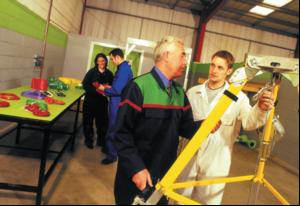A shortage of skilled engineers means that employers can find it a challenge to meet requirements of
LOLER. Geoff Holden explains what the LEEA is doing about this
In common with many other
engineering disciplines, in A shortage of skilled engineers means that employers can find it a challenge to meet requirements of
LOLER. Geoff Holden explains what the LEEA is doing about this
In common with many other
engineering disciplines, in recent
years the overhead lifting industry
has suffered from a shortfall in the
supply of skilled and experienced staff.
There are any number of reasons for
this, ranging from the decline in
traditional apprenticeship schemes to
the rapid growth in demand for
personnel in areas such as the Middle
East, Africa and Australasia. The result is
that employers can find it a challenge to
meet requirements of LOLER (Lifting
Operations and Lifting Equipment
Regulations). Most notably these include
ensuring that lifting operations are
planned, organised and performed by
competent people, and that lifting
equipment is subject to ongoing
thorough examination and inspection.
For decades, the LEEA has been developing
and accrediting engineers for the testing,
inspection and examination of overhead
lifting equipment. The Association's
Diploma is industry-recognised, and a
long-standing correspondence course has
proved a successful training route for
thousands of students. However, over the
last few years it has become apparent that
more needs to be done to keep pace with
a rapidly evolving industry.
Modernised programme
For example, the Diploma examination
and training programme is being
modernised to reflect the aforementioned
globalisation of the overhead lifting
sector. An online training portal has been
created, making it readily accessible to
students working right across the world.
The Diploma exam is also a truly
international event, with exam centres in
over 30 different countries used by several
hundred students every year. And the
LEEA's theoretical training has now been
supplemented by a range of 'hands on'
practical courses, held either at a purposebuilt
centre in Huntingdon, or any
suitable premises around the globe.
Steps have also been taken to enhance
the professional status of overhead lifting
engineers, perhaps most notably in the
form of CPD accreditation for the LEEA's
training courses, and a new 'TEAM Card'
registration scheme for engineers that
pass the Diploma exam. At the same time
accessibility has been enhanced, following
the decision to no longer restrict LEEA
training to employees of member
companies. As a result, any individual can
sign up for LEEA training, creating career
opportunities for those prepared to develop
new skills and, in the longer term, boosting
the pool of talent available to employers.
Of course test and examination of
lifting equipment is just one of the
disciplines for which LOLER demands
competent staff. On a day to day basis,
employers responsible for overhead lifting
are most likely to need skilled staff for
planning, supervision and operation.
Tragically, the use of untrained personnel
in one or more of these roles is a common
characteristic of lifting-related accidents.
LOLER has certainly succeeded in
focusing attention on the need for
training, and there is no shortage of
commercial provision. Unfortunately, a
significant proportion of this training
lacks the quality and rigour necessary to
have a real impact on the safety of
overhead lifting. Essentially such training
amounts to no more than a box-ticking
exercise on the part of the employer.
Accredited training
Another recent initiative aims to tackle
this problem. Launched in 2009, the
LEEA's accreditation scheme provides a
range of independently verified training
courses for staff involved in the use or
management of overhead lifting
equipment. LEEA member companies
that meet the standards required by the
scheme are able to offer these courses
commercially, and display a LEEA
Accredited Training Company logo.
In a competitive market, it can prove
all but impossible for individual
companies to try and address a shortfall
in skilled and experienced engineers in
industries such as overhead lifting. With
the ever-present risk of losing staff to
competitors before their employer has
had a chance to recoup its investment, the
economics of purely in-house training
simply don't add up. In such
circumstances, trade associations are well
placed to provide solutions. Operating on
a not-for-profit basis and with the broad
support of an industry, rigorous and
credible training, examination and
accreditation can be offered at a
reasonable cost. At the same time, a host
of other benefits are delivered, including
the creation of career opportunities for
aspiring engineers, an enhancement in
professional status, and invaluable
assistance for employers that recognise
the vital role played by properly trained
staff in safety-critical operations such as
overhead lifting.
Member companies include those
involved in the design, manufacture, hire,
repair, refurbishment, test, examination,
verification and use of lifting equipment.
Applicants are subject to an initial
technical audit before full membership is
granted, and then to a continuing
programme of assessments.
Geoff Holden is chief executive of the Lifting
Equipment Engineers Association (LEEA)


